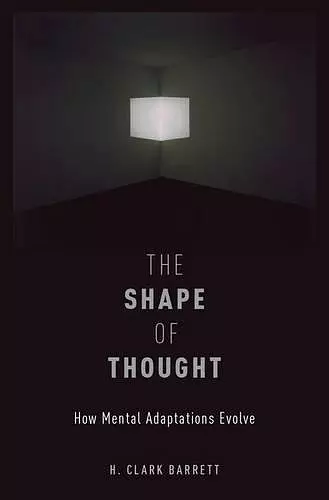The Shape of Thought
How Mental Adaptations Evolve
Format:Paperback
Publisher:Oxford University Press Inc
Published:12th Feb '15
Currently unavailable, and unfortunately no date known when it will be back
This paperback is available in another edition too:
- Hardback£127.50(9780199348305)

The Shape of Thought: How Mental Adaptations Evolve presents a road map for an evolutionary psychology of the twenty-first century. It brings together theory from biology and cognitive science to show how the brain can be composed of specialized adaptations, and yet also an organ of plasticity. Although mental adaptations have typically been seen as monolithic, hard-wired components frozen in the evolutionary past, The Shape of Thought presents a new view of mental adaptations as diverse and variable, with distinct functions and evolutionary histories that shape how they develop, what information they use, and what they do with that information. The book describes how advances in evolutionary developmental biology can be applied to the brain by focusing on the design of the developmental systems that build it. Crucially, developmental systems can be plastic, designed by the process of natural selection to build adaptive phenotypes using the rich information available in our social and physical environments. This approach bridges the long-standing divide between "nativist" approaches to development, based on innateness, and "empiricist" approaches, based on learning. It shows how a view of humans as a flexible, culturally-dependent species is compatible with a complexly specialized brain, and how the nature of our flexibility can be better understood by confronting the evolved design of the organ on which that flexibility depends.
Rich and thoughtful, this book lays out why, if we want to understand human psychology, neural plasticity, cultural differences and cognitive development, we need evolutionary theory, and an understanding of how humans evolved. In Barrett's hands, the pernicious dichotomy that divides "learning" from "innate" explanations crumbles, leaving only evolutionary explanations, which may involve different types of developmental processes. In setting the house back in order, Barrett synthesizes insights and findings from psychology, culture-gene coevolutionary theory, anthropology, developmental biology and philosophy. He delivers Evolutionary Psychology 2.0. * Joe Henrich, Canada Research Chair in Culture, Cognition and Coevolution, University of British Columbia *
In this lucid book, Barrett explains how thinking about the evolution of the mind should shape our understanding of how the mind works. Bringing sophisticated knowledge of evolutionary biology and cognitive science together, he reconciles opposing views about the role learning and culture in the workings of the human mind. This book will be the bible for a broader, more inclusive evolutionary psychology. * Rob Boyd, Origins Professor, Arizona State University *
Barrett has read your mind, and knows your questions. He will lead you gently but fiercely through the controversies that surround evolutionary psychology and cognitive science, showing you that one cannot exist without the other. * Leda Cosmides, Center for Evolutionary Psychology, University of California, Santa Barbara *
Clark Barrett takes the reader from the basics of evolutionary psychology to exciting stuff at the cutting-edge of today's research. He does so with splendid clarity, illuminating examples, and an engaging balance of wisdom and passion. An important book and an excellent read! * Dan Sperber, Professor of Cognitive Science and of Philosophy at the Central European University, Budapest *
ISBN: 9780199348312
Dimensions: 231mm x 155mm x 31mm
Weight: 522g
416 pages